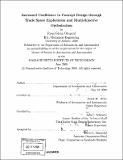Increased confidence in concept design through trade space exploration and multiobjective optimization
Author(s)
Odegard, Ryan Glenn
DownloadFull printable version (48.83Mb)
Other Contributors
Massachusetts Institute of Technology. Dept. of Aeronautics and Astronautics.
Advisor
David W. Miller and Jana L. Schwartz.
Terms of use
Metadata
Show full item recordAbstract
The growing size, complexity and demands of engineering systems requires paying greater attention to the initial design of the system concept. To improve the process by which concept design is carried out, this thesis develops an Engineering Framework for Concept Development. The Engineering Framework is applicable to a diverse range of concept design problems. It helps guide the otherwise haphazard process of the early stages of design to provide confidence that the chosen concept is superior to a large set of alternatives. Accompanying the Engineering Framework is a collection of tools which aid the designer in analyzing different options. Two tools in particular are demonstrated for their mutually beneficial characteristics: 1) Object-Process Network is used to explore the full space of options, revealing the relationships among design decisions and system performance, and 2) a particle.swarm optimization algorithm is implemented to efficiently search through the design space. The use of such an optimization algorithm becomes especially advantageous when higher fidelity models are included in the analysis because it is able to quickly identify the most favorable families of designs. The complementary approaches of exploring the entire trade space and then efficiently searching for the best groups of designs are shown to provide valuable insights in concept design problems. Two case study examples are presented as applications of the Engineering Framework and design tools. The first is an air-launched sounding rocket propulsion system design. The second is the design of a responsive disaster monitoring system. In each case, the use of the Engineering Framework and concept design tools give the designer increased confidence that quality concept designs have been identified.
Description
Thesis (S.M.)--Massachusetts Institute of Technology, Dept. of Aeronautics and Astronautics, 2008. Includes bibliographical references (p. 134-143).
Date issued
2008Department
Massachusetts Institute of Technology. Department of Aeronautics and AstronauticsPublisher
Massachusetts Institute of Technology
Keywords
Aeronautics and Astronautics.